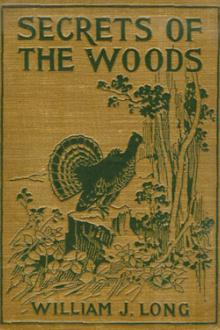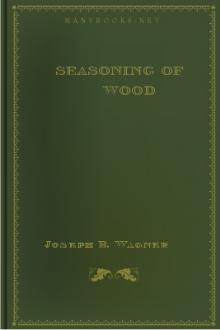Secret of the Woods by William J. Long (novels for students .TXT) 📕

- Author: William J. Long
- Performer: -
Book online «Secret of the Woods by William J. Long (novels for students .TXT) 📕». Author William J. Long
Simmo was full of wonder, for an Indian notices few things in the woods beside those that pertain to his trapping and hunting; and to see a mouse wash his face was as incomprehensible to him as to see me read a book. But all wood mice are very cleanly; they have none of the strong odors of our house mice. Afterwards, while getting acquainted, I saw him wash many times in the plate of water that I kept filled near his den; but he never washed more than his face and the sensitive spot behind his ears. Sometimes, however, when I have seen him swimming in the lake or river, I have wondered whether he were going on a journey, or just bathing for the love of it, as he washed his face in my cup.
I left the cup where it was and spread a feast for the little guest, cracker crumbs and a bit of candle end. In the morning they were gone, the signs of several mice telling plainly who had been called in from the wilderness byways. That was the introduction of man to beast. Soon they came regularly. I had only to scatter crumbs and squeak a few times like a mouse, when little streaks and flashes would appear on the moss or among the faded gold tapestries of old birch leaves, and the little wild things would come to my table, their eyes shining like jet, their tiny paws lifted to rub their whiskers or to shield themselves from the fear under which they lived continually.
They were not all alike—quite the contrary. One, the same who had washed in my cup, was gray and old, and wise from much dodging of enemies. His left ear was split from a fight, or an owl’s claw, probably, that just missed him as he dodged under a root. He was at once the shyest and boldest of the lot. For a day or two he came with marvelous stealth, making use of every dead leaf and root tangle to hide his approach, and shooting across the open spaces so quickly that one knew not what had happened-
-just a dun streak which ended in nothing. And the brown leaf gave no sign of what it sheltered. But once assured of his ground, he came boldly. This great man-creature, with his face close to the table, perfectly still but for his eyes, with a hand that moved gently if it moved at all, was not to be feared—that Tookhees felt instinctively. And this strange fire with hungry odors, and the white tent, and the comings and goings of men who were masters of the woods kept fox and lynx and owl far away—that he learned after a day or two. Only the mink, who crept in at night to steal the man’s fish, was to be feared. So Tookhees presently gave up his nocturnal habits and came out boldly into the sunlight. Ordinarily the little creatures come out in the dusk, when their quick movements are hidden among the shadows that creep and quiver. But with fear gone, they are only too glad to run about in the daylight, especially when good things to eat are calling them.
Besides the veteran there was a little mother-mouse, whose tiny gray jacket was still big enough to cover a wonderful mother love, as I afterwards found out. She never ate at my table, but carried her fare away into hiding, not to feed her little ones-they were, too small as yet—but thinking in some dumb way, behind the bright little eyes, that they needed her and that her life must be spared with greater precaution for their sakes. She would steal timidly to my table, always appearing from under a gray shred of bark on a fallen birch log, following the same path, first to a mossy stone, then to a dark hole under a root, then to a low brake, and along the underside of a billet of wood to the mouse table. There she would stuff both cheeks hurriedly, till they bulged as if she had toothache, and steal away by the same path, disappearing at last under the shred of gray bark.
For a long time it puzzled me to find her nest, which I knew could not be far away. It was not in the birch log where she disappeared—that was hollow the whole length—nor was it anywhere beneath it. Some distance away was a large stone, half covered by the green moss which reached up from every side. The most careful search here had failed to discover any trace of Tookhees’ doorway; so one day when the wind blew half a gale and I was going out on the lake alone, I picked up this stone to put in the bow of my canoe. That was to steady the little craft by bringing her nose down to grip the water. Then the secret was out, and there it was in a little dome of dried grass among some spruce roots under the stone.
The mother was away foraging, but a faint sibilant squeaking within the dome told me that the little ones were there, and hungry as usual. As I watched there was a swift movement in a tunnel among the roots, and the mother-mouse came rushing back.
She paused a moment, lifting her forepaws against a root to sniff what danger threatened. Then she saw my face bending over the opening—Et tu Brute! and she darted into the nest. In a moment she was out again and disappeared into her tunnel, running swiftly with her little ones hanging to her sides by a grip that could not be shaken,—all but one, a delicate pink creature that one could hide in a thimble, and that snuggled down in the darkest corner of my hand confidently.
It was ten minutes before the little mother came back, looking anxiously for the lost baby. When she found him safe in his own nest, with the man’s face still watching, she was half reassured; but when she threw herself down and the little one began to drink, she grew fearful again and ran away into the tunnel, the little one clinging to her side, this time securely.
I put the stone back and gathered the moss carefully about it. In a few days Mother Mouse was again at my table. I stole away to the stone, put my ear close to it, and heard with immense satisfaction tiny squeaks, which told me that the house was again occupied. Then I watched to find the path by which Mother Mouse came to her own. When her cheeks were full, she disappeared under the shred of bark by her usual route. That led into the hollow center of the birch log, which she followed to the end, where she paused a moment, eyes, ears, and nostrils busy; then she jumped to a tangle of roots and dead leaves, beneath which was a tunnel that led, deep down under the moss, straight to her nest beneath the stone.
Besides these older mice, there were five or six smaller ones, all shy save one, who from the first showed not the slightest fear but came straight to my hand, ate his crumbs, and went up my sleeve, and proceeded to make himself a warm nest there by nibbling wool from my flannel shirt.
In strong contrast to this little fellow was another who knew too well what fear meant. He belonged to another tribe that had not yet grown accustomed to man’s ways. I learned too late how careful one must be in handling the little creatures that live continually in the land where fear reigns.
A little way behind my tent was a great fallen log, mouldy and moss-grown, with twin-flowers shaking their bells along its length, under which lived a whole colony of wood mice. They ate the crumbs that I placed by the log; but they could never be tolled to my table, whether because they had no split-eared old veteran to spy out the man’s ways, or because my own colony drove them away, I could never find out. One day I saw Tookhees dive under the big log as I approached, and having nothing more important to do, I placed one big crumb near his entrance, stretched out in the moss, hid my hand in a dead brake near the tempting morsel, and squeaked the call. In a moment Tookhees’
nose and eyes appeared in his doorway, his whiskers twitching nervously as he smelled the candle grease. But he was suspicious of the big object, or perhaps he smelled the man too and was afraid, for after much dodging in and out he disappeared altogether.
I was wondering how long his hunger would battle with his caution, when I saw the moss near my bait stir from beneath. A little waving of the moss blossoms, and Tookhees’ nose and eyes appeared out of the ground for an instant, sniffing in all directions. His little scheme was evident enough now; he was tunneling for the morsel that he dared not take openly. I watched with breathless interest as a faint quiver nearer my bait showed where he was pushing his works. Then the moss stirred cautiously close beside his objective; a hole opened; the morsel tumbled in, and Tookhees was gone with his prize.
I placed more crumbs from my pocket in the same place, and presently three or four mice were nibbling them. One sat up close by the dead brake, holding a bit of bread in his forepaws like a squirrel. The brake stirred suddenly; before he could jump my hand closed over him, and slipping the other hand beneath him I held him up to my face to watch him between my fingers. He made no movement to escape, but only trembled violently. His legs seemed too weak to support his weight now; he lay down; his eyes closed. One convulsive twitch and he was dead—dead of fright in a hand which had not harmed him.
It was at this colony, whose members were all strangers to me, that I learned in a peculiar way of the visiting habits of wood mice, and at the same time another lesson that I shall not soon forget. For several days I had been trying every legitimate way in vain to catch a big trout, a monster of his kind, that lived in an eddy behind a rock up at the inlet. Trout were scarce in that lake, and in summer the big fish are always lazy and hard to catch. I was trout hungry most of the time, for the fish that I caught were small, and few and far between. Several times, however, when casting from the shore at the inlet for small fish, I had seen swirls in a great eddy near the farther shore, which told me plainly of big fish beneath; and one day, when a huge trout rolled half his length out of water behind my fly, small fry lost all their interest and I promised myself the joy of feeling my rod bend and tingle beneath the rush of that big trout if it took all summer.
Flies were no use. I offered him a bookful, every variety of shape and color, at dawn and dusk, without tempting him. I tried grubs, which bass like, and a frog’s leg, which no pickerel can resist, and little frogs, such as big trout hunt among the lily pads in the twilight,—all without pleasing him. And then waterbeetles, and a red squirrel’s tail-tip, which makes





Comments (0)